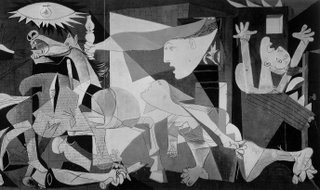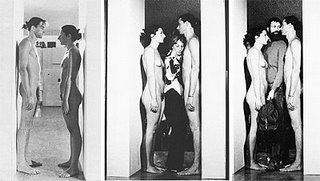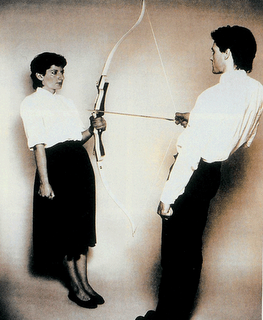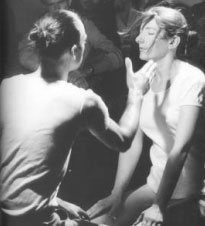MakerThinker: Power


Makerthinking is bottom-up, explores instead of dictates, and is relationship-based. It's not about revolution, it's about evolution, and this relationship to power is important because it is innate, and is therefore harder to undermine or co-opt.
Makerthinking is simply manipulating the world and watching what the effects of that manipulation are. Rather than imagine a utopia or attempt to process or decry the despair of this dystopia, or even have an idea the makerthinker asks the world, "What happens if I do this?"

This act is more powerful than one might think, and is powerful in a way that is relevant right now. Marina Abramovic and Ulay harnessed this power more directly, and with higher stakes, than... well, than anyone else needs to, and to powerful effect. Their collaborative work is all about finding and exploiting direct, physical power relationships.

This work can only be read in terms of power, but what kind of power? Ulay and Abramovic are not representing the proletariat like Rivera or Siqueros, and are not assuming responsibility for a grand idea like a war. Rather, they are making actual war with one another, in countless little ways that get across a whole another point. To look at Guernica is to understand a moment in history when one human being was entitled to think of himself as important enough to tell us all about the horrors of war. To look at Abramovic and Ulay's body of collaborative work is to understand that war is made up of acts by individuals, and that we all have a stake in war.
Or to put it another way, Guernica tells us what to think about war. Abramovic and Ulay point out that we are war.

Makerthinkers refuse the distancing action of intellectual thought or art that illustrates ideas by forcing the thinking to happen within the sphere of their own body. Makerthinkers refuse to make magic or fall into grand ideas or make us out to be more than what we actually are. Instead of assigning value to the world from the inside of their minds out, makerthinkers mine what actually happens in search of evidence about our relationships to the world we inhabit. This is a det of small-t truths that anyone can find and own--a bottom-up rearrangement of power that evolves from questioning where you are and what you are doing. This is an actual manifestation of the people's power. It is critical to behaving morally in a democracy. It is the only kind of power that evades king-of-the-hillism (and its corrolary, co-optation).
And at a time when our relationships to the surrounding world are making us lobsters in a pot, when the Rove Engine has made us all complicit in not caring enough about the fact that we, people in a democracy, are Iraq--when we have intellectualized ourselves into a highly attenuated, scary, unsustainable world of global corporate feudalism...when we actually are waging fucking jihad...
...any other kind of power or big-t Truth rings hollow.

6 Comments:
Kudos on postingthe Abramovic/Ulay piece. One of my favorites. So strong and simple. Brilliant.
I don't think distance is necc. a bad thing. Lots of disciplines create distance and abstraction, and this can be a helpful lens.
I am against a specific kind of distance: the power to claim a universal point of view. I am not against this because it's inherently evil as much as because it's a played-out strategy that is harmful-to-irrelevant right now.
Picasso was assuming the right to represent War as a concept, and that's an awfully grand thing to do. It's a powerful gesture. He isn't wrong or irresponsible about his portrayal of war, but this strategy backfires now that "The Peace Movement" has been co-opted. See The Biennial's use of Richard Serra's genuine taking-on of War, and how badly it worked because it was in the Whitney.
Localized power, or a taoist sensibility about power, or commanding what you can actually influence without relying on larger power structures... this is a smarter strategy right now.
It's a smarter strategy for increasing power because:
1. We live in a world full of total fucking lies, to the point that nobody really cares about telling the truth. Frank Rich: "Truthiness".
2. "Truthiness" evolves out of the mass realization that truth is subjective, that truth and power are inextricably linked.
3. And yet, even in a world where we do not fucking impeach the lying sack of shit president for being a liar, and when we even kind of expect him to be a total liar, we can all still agree that there are some things that are more true than others. That truth as a concept is valuable.
Yes, truth is power, of course it's valuable. How does one completely powerless individual in a "democracy" set adrift reclaim truth and power? Start small. Gravity still works, it's still true that anything with mass wants to hug the earth. Own that. What else is true? True because you can simply prove it?
I don’t really get it: why the word "revolution" in your article points to my comment on LeisureArts. Stating the fact that there are more fair social systems than the one in the US is not a call to revolution. Maybe a word like "Sweden" should point to that page. The argument you made there – that “Castro is a monster”, so all socialist theory is a bunch of rubbish - sounds like a dated Cold World propaganda. These “monsters” are not endemic to socialist regimes – like for example the Guantanamo-Bay-Abu-Ghraib-40.000-Iraques Dead kind of monster. Nor are other Central American countries great bastions of freedom, being brutalized for a century by American imperialist politics.
It is ironic that despite your aversion towards anything that even superficially sounds like socialism, you chose to talk of Marina Abramovic here. Abramovic grew up in Yugoslavia, back then a socialist [you’d call it a communist] state - a big friend of Cuba! Both of her parents belonged to the communist party elite [I guess they would be some kind of “monsters” too]. So she as a person and artist is very much defined by this environment. Maybe her work is not "representing the proletariat" because she came from a privileged background, as most artists do. Or maybe it is a revolt towards her parent’s Marxist ideology. One way or the other, making art about yourself is nothing new in the 20th century art - it is far more common than the artwork commenting social causes.
By the way - Picasso was a life long member of the communist party – another potential monster.
I'm not opposed to socialism, particularly democratic socialism as it's practiced in countries like Sweden.
What I am opposed to is fascism, or the implementation of a top-down socialist state. The interesting thing about Europe is the way every individual has a stake in government--democratic socialism works. That implementation of socialism comes from the bottom and moves its way up.
Your assertions on Leisurearts were all about revolution as opposed to evolution---you were asking for huge changes that can only come from the top and move down. I don't blame you. America is really fucked up. But I am a pragmatist--I don't see large scale doing anything but disempowering people on a practical level.
you're assertion that we can now still refererence Guernica is the result of Piccaso being granted some special privilege ignores the fact the at the time he WAS the only one capable of making such a visual statement. to deny this is is to ignore his unique ability to imbue every line with meaning, to speak in a truly visual language. When Modernism was still making fresh discoveries the voice of the indivdual did matter. While the artists today must still strive for their voices as an individuals, the possilbilies,by that i mean the building blocks of artistic languge, have become hackneyed. This sort of denial of a great artists power ie. he "was claiming power" we see here is the result of an art marketing system that must denigrate the achievements of the past to sell the inferior work of the present.
The people of the thirties weren't lobsters in a pot?, victim to the destructive whims of capitalism and the media? The world hasn't changed, the possiblilites for art have. Art is cannot even seem to influence power if its gestures become trivial even to itself.
Post a Comment
<< Home